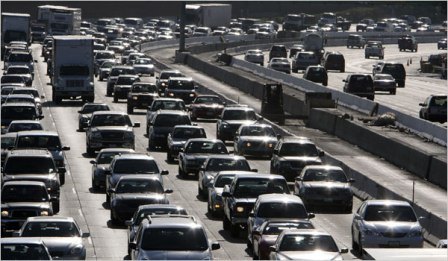CA's Anti-Sprawl Bill Crucifies Cars
"Crucifies" may be a bit harsh. Or maybe it isn't. It's hard to tell. The New York Times article detailing the Golden State's new real estate development legislation waits until the eighth paragraph to chart the changes, and even then, it's not entirely clear how it works. "The bill yokes three regulatory and permit processes. One focuses on regional planning: how land use should be split among industry, agriculture, homes, open space and commercial centers. Another governs where roads and bridges are built. A third sets out housing needs and responsibilities… Under the pending measure, the three regulatory and permit processes must be synchronized to meet new goals, set by the state’s Air Resources Board, to reduce heat-trapping gases. Seventeen regional planning groups from across the state will submit their land-use, transportation and housing plans to the board. If the board rules that a plan will fall short of its emissions targets, then an alternative blueprint for meeting the goals must be developed. Once state approval is granted, or an alternative plan submitted, billions of dollars in state and federal transportation subsidies can be awarded. The law would allow the money to be distributed even if an alternative plan fails to pass muster." In English. "The goal is to encourage housing near current development and to reduce commutes to work." Or… "clustered communities," a new stick, the same old carrots and LOTS more red tape.
More by Jehovah Johnson


































Comments
Join the conversation
California's hyperactive legislature would profit by first reading Robert Bruegmann's "Sprawl: A Compact History." It likely would be surprised to learn such things as -- -- "the shift of population from the center of Paris to the suburbs has been greater than that in Chicago." -- "there is little evidence that suburban sprawl is accelerating and considerable evidence that the opposite is occurring." -- "many American urban areas [are] now becoming more, rather than less, dense. Chief among these is Los Angeles, which is today the densest urban area in America and at least as dense as many urban areas in Europe." -- "Portland [Oregon] is the country's largest experiment with a kind of regulatory system that has been used extensively in Europe since World War II but rarely in the United States on any scale. It can probably work in the United States only in places that have a coveted geographic location, extraordinary natural environment, or a set of large employers that can't easily relocate." From the description on the book's back cover: "Robert Bruegmann calls [sprawl] a logical consequence of economic growth and the democratization of society, with benefits that urban planners have failed to recognize. ... Bruegmann demonstrates that sprawl is neither recent nor particularly American, but as old as cities themselves. Nor is it the disaster claimed by many contemporary observers. Although sprawl ... has undoubtedly produced problems ... it has also provided millions of people with the kinds of mobility, privacy, and choices that were once the prerogatives of the rich and powerful." Ah well, it is an American trait to "hurry up and do something" even if neither the problem nor the remedy is well understood.
Areitu: "In Houston, a friend’s tuner shop was across the street from a nice 5000 sq ft mansion. This benefited a lot of people, such as businesses who install double-pane glass and soundproofing, for when the shop does dyno runs late into the night. See? The free market model works." What does "free market" have to do with creating or abating a public nuisance? Houston is notable for eschewing the typical urban reliance on land-use zoning. Instead, it has the ubiquitous practice of placing use restrictions in deeds. That seems to have accomplished what zoning is intended to do; studies show little difference between Houston and other cities in land use patterns. We're given no other information about the tuner shop and the hapless occupants of the mansion across the street. But assuming the tuner shop is not in violation of a deed restriction, I'd advise the homeowner to check the city's noise control ordinance.
ppellico, I live in the Peoples' Republic of New Jersey, where our zoning laws make Soviet Russia look like a Milton Friedman paradise. I should know, because I am a land use attorney. While I can agree in principle that good planning can help, it has devolved into a tool by the government and neighbors to stop anything and everything. Also, rezoning anyone's property to a use, or a design standard such as 2 acre lots when it was once 1 acre lots, is an unconstitutional taking of that property owner's property. As for your comment about an $800K house having property taxes of $10,000 per year, my parents just sold their house for $390K and their annual property taxes are $10,000! People, the government is NOT the answer!